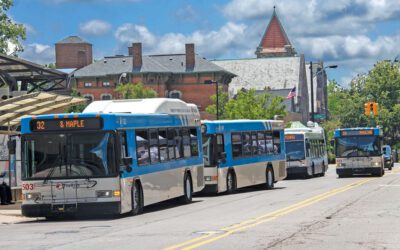Last November’s election of five new members profoundly transformed city council. In place of the previous majority’s preservationist inclinations, the new majority is eager to see changes in the city–especially by increasing the housing supply.
This spring and summer, they plan to advance resolutions to develop affordable housing on city-owned property downtown, including the former YMCA site and parking lots at Ashley and Willam and Fourth and Catherine, using last year’s affordable housing millage to help pay for it. They want to make it much easier for homeowners to build “accessory dwelling units.” And they’re looking to advance a “transit oriented zoning ordinance” that would allow more intense development along major bus corridors, including Plymouth, Washtenaw, W. Stadium-Maple, and the State and Eisenhower area. If all are adopted, the changes could add thousands of housing units to the city over the next few years.
New councilmember Lisa Disch believes their ambitious agenda has “broad community support,” noting that all five winning councilmembers “campaigned on these issues.” Newcomer Erica Briggs agrees. “Housing affordability was the biggest issue that I heard when I was campaigning,” says the former planning commissioner. “People understand that housing is becoming unaffordable in our community and that we need to address this problem.”
Mayor Christopher Taylor says he endorsed all five winners because they “ran on the common platform of affordability and a shortage of housing being a problem and the construction of affordable housing being the solution.”
While encouraging new construction, however, the majority also plans to reverse a decision by the previous, preservation-minded majority to shut down some existing short-term rental (STR) businesses. Though homes and apartments rented through Airbnb and other STR companies crowd out long-term residents, Mayor Taylor says the law left the city vulnerable to lawsuits by STR owners.
Developing downtown city-owned properties has the quickest potential payoff. Taylor calls the lot at Ashley and William “an incredible opportunity. It’s obviously a lot of land in a spot where the city can take real and meaningful action.” What’s likely to go there is mixed-use retail and housing for 500 to 600 people with an emphasis on affordable housing. Beyond easy access to jobs and transportation, Briggs says, another reason to develop downtown sites is that they “rank highest in terms of getting federal support.”
This is likely to be the least controversial part of the new majority’s agenda. Councilmember Kathy Griswold, who generally aligns with the former majority, calls building on city-owned lots “a great idea … Fourth and Catherine will be difficult based on its location but I think that the Y lot and the [Ashley and William] lot can be done with much less disruption.”
Transit-oriented development, Disch says, “has the potential to encourage mini-downtowns to open up all over Ann Arbor.” Disch, who now represents council on the planning commission, thinks “it would be wonderful to have more neighborhoods that people considered to be a destination to go and have a cup of coffee, a lunch, or dinner in a quirky restaurant.”
“Eighty thousand people (plus or minus) commute in and out of the city every day,” Taylor points out. “The expansion of residential units on transit lines will provide these folks [an opportunity to] live in Ann Arbor.” And the mayor firmly believes that “the more people who work in Ann Arbor [and] are able to live in Ann Arbor, the better.”
Griswold, whose Ward Two includes a stretch on Washtenaw that could see more intense development, says she supports it–though she believes “it’s going to naturally occur regardless.”
In March, the planning commission voted unanimously to relax accessory dwelling unit requirements and expand the zoning districts where they are allowed. But based on experience in other cities, “we’re not going to have a wholesale rush,” Taylor predicts. “The growth of ADUs will be modest. I think their integration into neighborhoods will be smooth.”
In theory, the city already permits ADUs, small units attached to existing residences. But the rules are so restrictive that only a handful have been built–for instance, the occupant must be related to the property owner, and can’t pay rent. Proposed changes would drop those requirements, permit ADUs on smaller lots, and allow the construction of freestanding buildings.
“The point of all this is not to get more ADUs for their own sake,” says Briggs. “It’s really to increase the supply of a more affordable and diverse type of housing.”
Griswold agrees that ADUs are “a good concept, and we want it allow for that flexibility for land owners.” But she says that deed restrictions could make it difficult. “If I wanted to build an ADU, the city would allow me to, and then my neighbors would sue me because I was in violation of the deed restrictions” in her own neighborhood off Glazier Way.
“It’s not going to be one solution” that expands the supply of housing, Briggs says. “It’s not going to be short-term rentals, accessory dwelling units, or transit-supported development.” She believes the solution is to take “a wide variety of different approaches”–and she thinks they’ll all happen this year.
The one change that will diminish the housing supply is reversing the previous majority’s vote last fall to retroactively prohibit absentee-owned short-term rentals in residential zones. The ban was supposed to take effect March 1 but has not been implemented, and the new majority plans to allow existing STRs to continue.
“The prior council passed a resolution which I don’t believe would stand legal scrutiny,” Taylor explains. “We’re fixing a mess.” In an email, he explains that while the changes would grandfather in existing ones, “as non-owner occupied STRs in residential areas go off line, no new ones will be permitted.”
Disch expects council to consider the changes “within the next month or so. And I would hope that we do not debate it over the course of more than one meeting.”
Griswold agrees the short-term rental situation is “really messy.” But at this point, she doubts that city council can solve the problem: “I think it’s going to take a court decision.”





